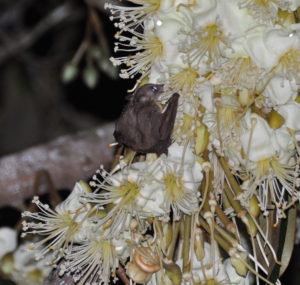Protecting habitat to promote pollinators, especially bees, should be used as a fundamental part of farming to secure and increase yield in pollinated crops, according to the first internationally-coordinated review.
Globally, 1.4 billion jobs are dependent on pollinators, such as bees, and three-quarters of crops, worth $500 billion annually, rely on animal pollination.
The review, published in Nature, identifies a range of solutions to threats facing the animals and how they can be better used to promote production of the world’s food sources that rely on pollination.
Wild and managed pollinators — vertebrates such as bats and lizards and thousands of species of insect — provide a host of benefits to humans, ranging from contributions to industrial crop production to food security for rural communities through honey-hunting and beekeeping practices based on indigenous and local knowledge in more than 50 countries.

The 20,000 identified species of bees, in particular, pollinate more than 90 per cent of the world’s pollinator-dependant crops.
Despite their importance, 9 per cent of bees and 9 per cent of butterflies are threatened in Europe.
The research identified five major causes driving pollinator decline: changes in land use and intensity, climate change, pesticides, management of pathogens, and invasive alien species.
Strengthening pollinator-friendly practices in the diversified farming systems supported by many indigenous peoples and local communities globally was identified as a key response to changes in land use and intensity.
Dr Ro Hill, Senior Research Scientist at CSIRO, led the global assessment of evidence from indigenous and local knowledge systems for the review, which complement the evidence from science - the first global assessment of biodiversity to include information and recommendations from Indigenous and local knowledge.
“Indigenous communities around the world understand local biodiversity in detail,” Dr Hill said.
“This review provides examples from many locations where practices relevant to supporting pollinators and pollination are based on Indigenous and local knowledge.”
She said Australia was lucky the Varroa mite which had devastated bee populations in other parts of the world was not widespread.
“But intense farming systems where we see big monocultures and where we don’t see little strips of habitat in them are very problematic for keeping pollinators healthy,” she said.
“Herbicides removing weeds are removing a lot of the food sources for pollinators, those practices are problematic as well.
“We found by many solutions can come from working with indigenous cultures and local communities.
“For example, diversified farming systems include home gardens in Mexico, agro-forests in South East Asia where indigenous people are bringing a whole diverse range of pollinators into their gardens by having lot of different plants, one study identified more than 400 different plant species in one garden.
“One of the recommendations that we’ve made is to strengthen those diverse farming systems and not assume you need to replace with industrial farming systems.
“In fact you can increase yields with pollinators.”
Measures such as intercropping, using crop rotations that include flowering crops, incorporating wild plants in home gardens, and customary rules that protect pollinator habitat can be expected to foster diverse pollinators.
Benefits for pollinators can be supported through biocultural conservation approaches that recognise rights and address effects such as loss of access to traditional territories and loss of traditional knowledge.
The authors conclude that future research was needed to determine which drivers were most important in different contexts to inform effective action.
“In some part of the world we’re now seeing pollinator pathways where they’re creating flowers and plants and patches of habitat all through urban areas – bee highways - and also through areas where you have farms,” Dr Hill said.
“Green infrastructure is seeing our parks and gardens and bits of bush are as important as our roads and our railway lines.
“We do know that we need pollinators for our food systems, the plants that do depend on pollinators are vital to a whole lot of essential minerals and nutrients, most of our Vitamin C and Vitamin A, so that increasing the success of pollination is something we really need to be attentive to.”
This was first distributed as a press release to coincide with the publication of the review in Nature. You can read an earlier CSIRO blog on the work of the Intergovernmental Science-Policy Platform on Biodiversity and Ecosystem Services and the Assessment of Pollinators, Pollination and Food Production.
